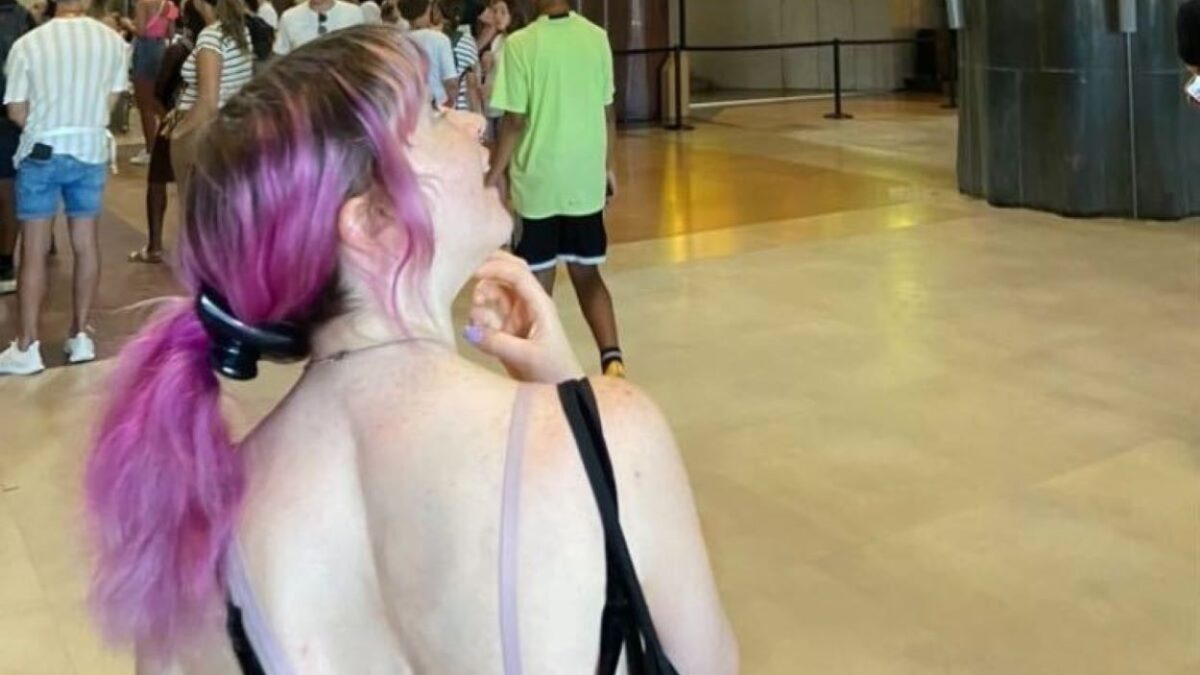I think when the word ‘disability’ comes to mind people have a mould: a single body they think fits the description. Having a ‘disability’ is often understood in reductive terms, like it’s a yes or no question. People consider a disability to be visual and something that they can identify as abnormal. There is no nuance in this perception: it’s a one-size-fits-all. Yet there isn’t just one disability, and even the same disability can look different on different people’s bodies.
You see those videos online of people shouting that someone shouldn’t have a blue badge because they can walk. A man in a train station telling a friend: ‘you’re too young to have a walking stick. You’re too fit’. These comments police our bodies, deciding whether we deserve access based on how ‘disabled’ we look. It’s almost as if our bodies exist as proof to legitimise our disabilities. If we are young or if we are attractive, we do not fit their mould. We are not seen as disabled. We are actively questioned and invalidated by complete strangers.
Being Invisible
People see bodies as an answer, an explanation. If there are no telltale signs of your disability then it does not exist. So, if your disability is invisible, you are treated as fully abled by those around you. Your access needs are continually questioned and almost never considered.
I have to fight to be seen as disabled, even if I do not like that label. I must force myself into a box in order to be seen by those around me. In a coffee shop with a friend, she turned her face to me and in a half-dejected, half-angry way said, ‘I’m just so sick of fighting. If I fought every inaccessible thing in my day, I would do nothing but fight.’
That idea of fighting stuck with me with a haunting irony. I am physically disabled yet must ‘fight’ harder than able-bodied people to get support. In this way my disability is pushed to the forefront: I am constantly fighting to be able to exist comfortably, so much so that there’s hardly time for anything else. Some are not as lucky as me. My disability still allows me to fight: an arsenal of articles and passive aggressive emails. Yet other people cannot fight as I can, their chronic illnesses binding them to bed, refusing to let them stand. They cannot be heard in the same way.
The Flip-Side
My spinal surgery that corrected my severe scoliosis has caused me to have limited mobility. I am able to walk, but not for long and I struggle to use stairs. Yet on the outside I look ‘normal’ and so considered not to have a disability by those who do not know its intricacies. However, my abnormal body sure does attract a lot of attention. I have always found it jarring, the way people feel so comfortable commenting on my body. Pick-up lines centred on how attractive my scar is; comments on how weak I look, how easy it would be to simply ‘snap your back in half’; being told that my scar encapsulates who I am as a person. It’s almost as if my back acts as a contact lens, altering the way I am perceived, my spine acting as the focal point of my personality.
I want to unzip my skin and step out of it, into a new unblemished body. I want to rip my scar off like a wax strip, rid of any mark that could be read into. I had never considered before that the perception of my body had changed the way the people closest to me saw me. My face blank, my scar screaming. Now comments on my scar, whether good or bad, always hang in my mind during the warmer months, reminding me that I am not seen as a whole person.
The comments encapsulate a wider problem. I am disabled enough to be treated as an anomaly, a curiosity to be ogled at, yet I am not perceived as actually having a disability by those around me.
Sometimes people forget as there is no visual reminder for them that I cannot stand for more than 30 mins without pain. But sometimes the invalidation is more active than this. I have been told to be grateful as I am ‘not as disabled as some’, told to ‘suck it up’ as I can walk. Not only am I ignored but I am also pitted against other people in the community. I am invalidated because my experience does not adhere to their expectation of a ‘disability’.
Eyes, Ears, Mouth and Toes
I often wonder why people rely on their sight more than their ears. Why they are so comfortable telling you how they feel about your body? Why they make judgements on how you look as opposed to what you tell them? If it’s not it’s an assertion that ‘you’re too fit’ to be disabled, then it’s a desire to use your wheelchair as a prop so they can feel like they’re ‘helping’. Consistently, disabled people are objectified, their bodies being denied existence. While this happens their experiences are still being invalidated, access being withheld or stripped away from them. It is a cycle of exploitation.
In a paradoxical sort of way, to be actually seen we must first be heard. To see us, you cannot simply look at us. We are people with autonomy and needs and it is imperative that non-disabled people support people with disabilities, listening and seeing us as what we are: people with disabilities. We are so much more than our bodies and should not have to put up with the hurtful and hateful comments from both strangers and those we love.
All I ask of those people reading my words is that you listen to us, hear us and understand us for who we are.

